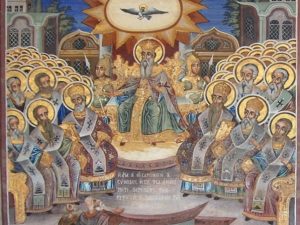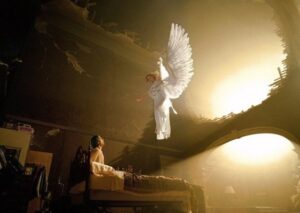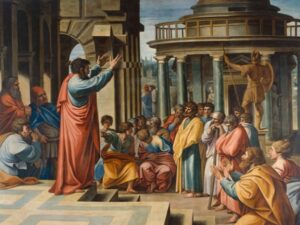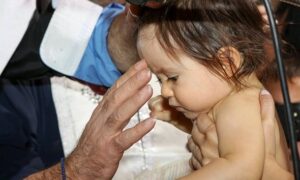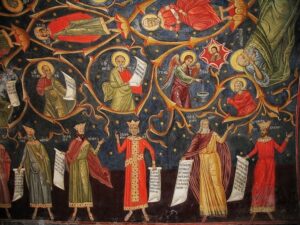Τhe Τriumph of Orthodoxy
5 March 2023Discourse on the First Sunday of Lent
On the first Sunday of Great Lent, our Holy Church celebrates the triumph of Orthodoxy, of the correct faith, which trampled down all heresies and has been established for ever. This is why this Sunday is called the Sunday of Orthodoxy. Heresies appeared from the very beginning of Christianity. The Apostles of Christ themselves warned their contemporaries, and us with them, about the danger from false teachers.
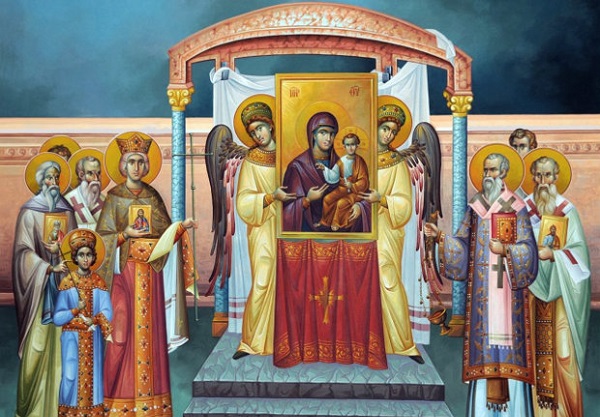
In his second universal epistle, Saint Peter writes: “But false prophets also arose among the people, just as among you there will be false teachers, who will secretly bring in destructive heresies, even denying the Master who bought them, bringing upon themselves swift perdition. And many will follow them in their lasciviousness, and because of them the way of truth will be blasphemed” (2 Peter, 2, 1-2).
When Saint Paul returned to Palestine from Greece, he broke his journey in Ephesus. To the Christian residents of the city, he said: “I know that, after my departure, ravening wolves will enter in among you, not sparing the flock, and from among your own selves shall men arise, speaking perverse things, to draw away the disciples after them” (Acts, 20, 29-30).
There were many such schismatics and false teachers in the first centuries of Christianity. Some heresies troubled the Church for centuries, such as, for example, those of Arios, Makedonios, Eftykhis, Dioskoros, Nestorios, and also that of iconoclasm. These heresies brought much turmoil to the Church and tormented it greatly. There were many confessors and martyrs who shed their blood in the defence of the true faith, in the battle against the false teachers and heretics.
There were also many great hierarchs who also suffered persecution and were often exiled. Saint Flavianus, Patriarch of Constantinople, for example, was beaten so brutally at a synod- called the Robber Council- which was presided over by Dioskoros, that he died three days later.
The last in the series of heresies, that of iconoclasm, was also the one which brought the greatest turmoil to the Orthodox Church. It first made its appearance in the time of Emperor Leo the Isaurian, who came to the throne in 717. He was raised to the throne with the assistance of the army, in which there were many opponents of the practice of reverencing the holy icons. Since he wanted to keep on the right side of the army, he instituted a harsh persecution against the iconodules.
This persecution continued in the time of Emperor Konstantinos Kopronymos, who succeeded to the throne after Leo. “Kopros” means excrement and he was given the name because he fouled the font during his baptism. For many years, these two emperors held authority in their hands and brought great misery to the Church. Other iconoclast emperors followed them and carried on the work of their predecessors, continuing to torment the Church over a long period of time.
We can’t begin to describe the distress the Church suffered in the years of iconoclasm, especially the monks, who were in the front line of the battle in favour of the holy icons. The iconoclast emperors closed many monasteries and turned into warehouses a large number of churches which contained icons. They tortured the monks brutally: put their eyes out, cut their noses off and broke icons over their heads. With red-hot irons, they burned the fingers of iconographers.
It was only when Empress Irene ascended the throne of Byzantium that the persecution died down, but not for good. In 787, Irene called the 7th Ecumenical Synod, which drew up the Orthodox teaching concerning the reverence of honour due to the holy icons. But even after this Synod there were emperors who were iconoclasts, such as, for example, Mikhaïl, and others. The heresy was finally destroyed once and for all by the most pious Empress Theodora when, in 842, she called a local Synod in Constantinople, which endorsed the Orthodox teaching. This Synod anathematized all those who dared say that reverencing the holy icons is idolatry and that, consequently, Orthodox Christians are idolaters.
And that’s exactly what the heretics say to us. They have the nerve to call our icons idols and us idolaters. There’s no end to their impertinence. Let me tell you about an event that happened recently in a town in Siberia. At the time of the Liturgy, two Baptists went into the church and began to shout that the Orthodox are idolaters and their icons idols. What nonsense!
How do they dare to open their scurvy lips and say such words, which drip poison, calling us idolaters and our icons idols? This shows that they haven’t properly understood the second commandment of the Mosaic law: “You shall not make for yourselves any idol or any likeness at all of what is in the heavens above or in the earth below or in the waters beneath the earth. You shall not bow down before them nor shall you worship them” (Ex.20, 4).
What does this commandment mean? I think it’s quite clear. The commandment forbids us to make idols and to bow down before them instead of doing so to the Only, One, True God. As the ancient people did: the Assyrians, the Babylonians, the Egyptians, the Greeks the Romans and others.
That’s idolatry. But when we reverence the holy icons, is that remotely like idolatry? Certainly not. Their images depicted something that didn’t exist in reality, something that was the fruit of imagination. Our icons portray reality. Did our Lord Jesus Christ, Whom we glorify and Whose icon we reverence not really live among us? Did Our Most Holy Lady, whom Saint Luke, the Apostle and Evangelist depicted, not live among us? Our Lady herself blessed that icon, saying that her grace would always be with it. Do you know how many miracles occur through icons of the Mother of God?
And the other icons, don’t they portray real figures of the saints of God, who lived here on earth? These icons are their portraits and are in no way idols. Only impious and unclean lips would dare to say that our icons are idols and that we’re idolaters. Let the impious be quiet, because the Ecumenical Synod declared an anathema against them.
You should know and you should remember not to get involved with heretics. Don’t draw away from the Church, don’t rend the garment of Christ. Don’t forget that in His prayer in Gethsemane, Christ entreated His Father: “that they may all be one, as you, father are in me and I in you, so that they may be in us and that the world will believe that you sent me” (Jn. 17, 21). The Lord wants the unity of the Church. The schismatics, who find fault with the teachings of the Church, have distanced themselves from it and believe they will find their salvation in their heretical organizations.
And do you know what the great saints said about the people who rend the garment of Christ? Saint Cyprian, Bishop of Carthage, said that people who leave the Church and have no contact with it, even if they become martyrs don’t cleanse their sin with their blood, because the grave sin of dividing the Church can’t be purified even by blood. And the holy martyr Ignatius the God-Bearer said that anyone who provokes a schism in the Church will not inherit the Kingdom of Heaven.
But all the heretics are preachers of schism. Saint Paul says: “I appeal to you, brothers, to watch out for those who create divisions and stumbling-blocks, contrary to the teaching that you have learnt; avoid them” (Rom. 16, 17). And in another epistle, he says: “If anyone preaches any Gospel other than the one you received, let that person be cursed” (Gal. 1, 9). And none of the heretics preach the Gospel which is proclaimed by the Orthodox Church, which gave birth to us spiritually. Remember, too, the word of our Lord Jesus Christ, Who said to the apostles and through them to us, their successors: “Those who listen to you, listen to me, and those who disregard you, disregard me. And anyone who disregards me, disregards him who sent me” (Lk. 10, 16). These words of the Lord are terrible. We should always remember them. And we shouldn’t forget this day, the day of the triumph of the Orthodox faith. This faith was formulated once and for all at the 7th Ecumenical Synod which confirmed Orthodoxy and trampled down all the heresies and schisms.
More than a thousand years have passed since the 7th Ecumenical Synod took place and there has been no other since. Why? The reasons are political. There has been no opportunity to call one. But let there be no regret that this is the case and that Ecumenical Synods aren’t taking place today. The seven we have took care of all the issues and resolved all the problems that the Church had with heresies, and confirmed the Orthodox faith.
You may say that we have lots of new heresies and schisms today. And you’d be right. But we should know that these new heresies don’t, in fact, say anything new; they merely repeat what the older heretics have already said. And all these heresies were anathematized by the 7th Ecumenical Synod. This is why the decisions of the Ecumenical Synods, particularly the 7th, are sufficient for us. This is why we rejoice and celebrate today the triumph of Orthodoxy, which was expressed and confirmed at the 7th Ecumenical Synod.
It is precisely for this reason that it has been ordained that a doxology be sung on this day, as thanksgiving to God for the confirmation of Orthodoxy. And we shall sing that doxology now.







